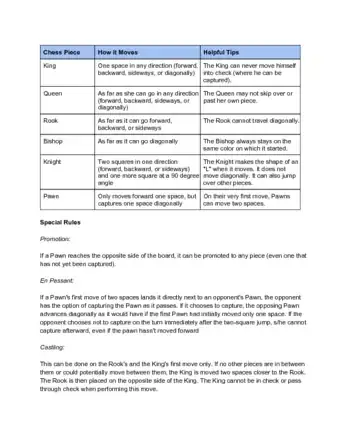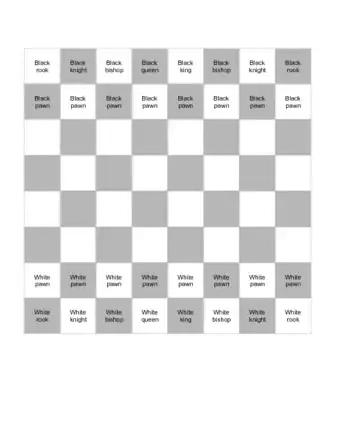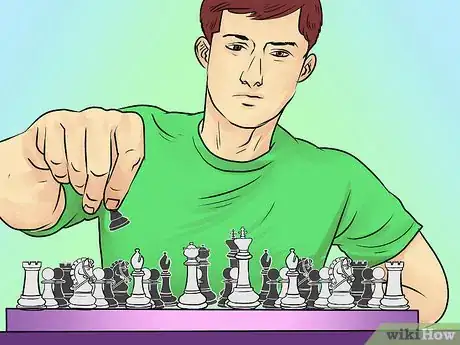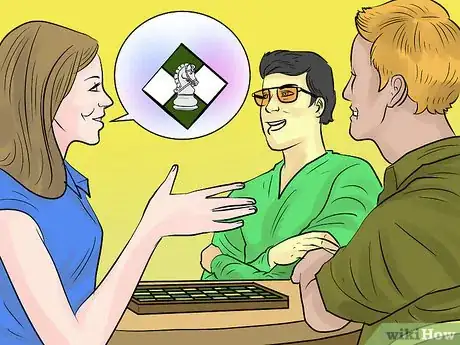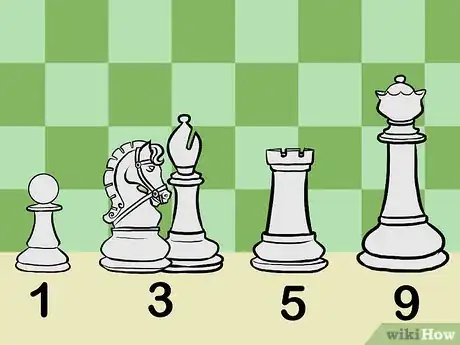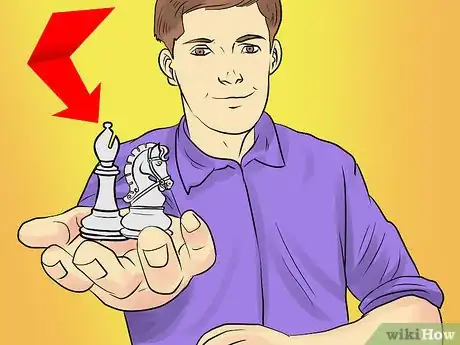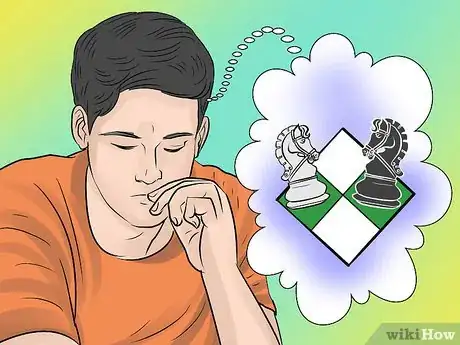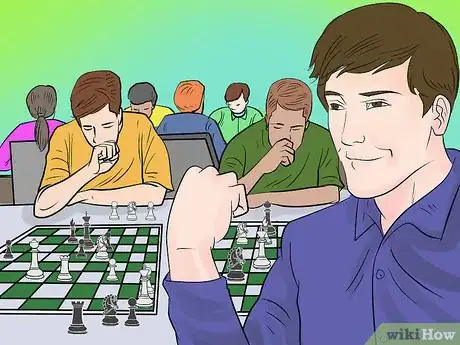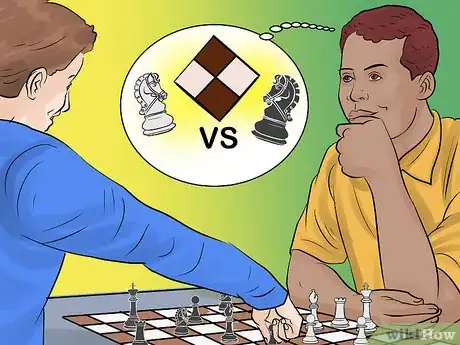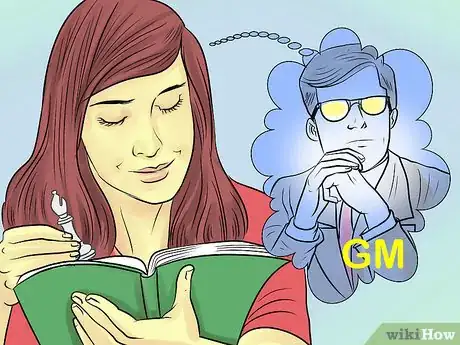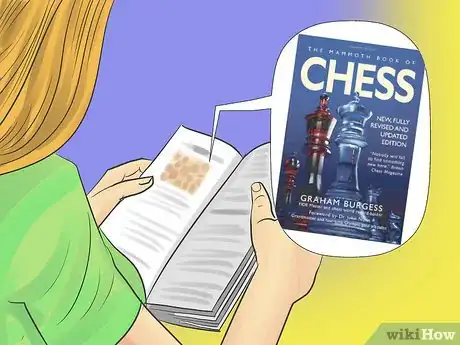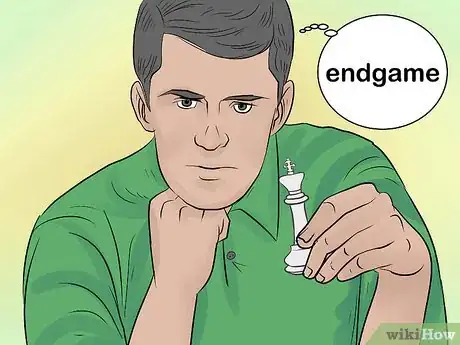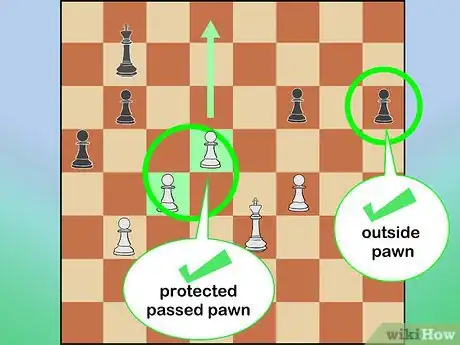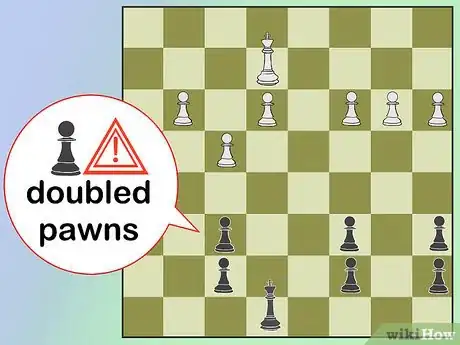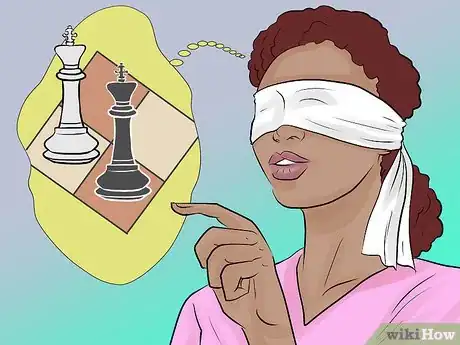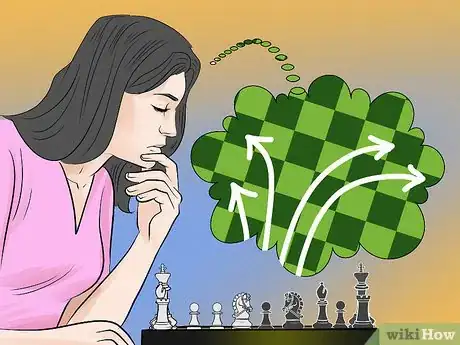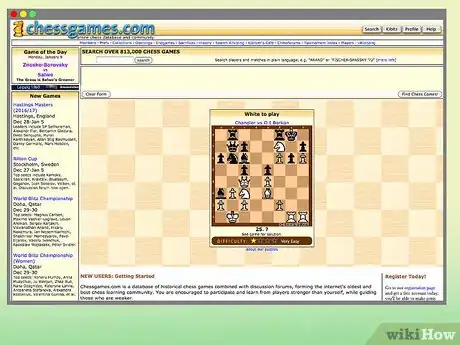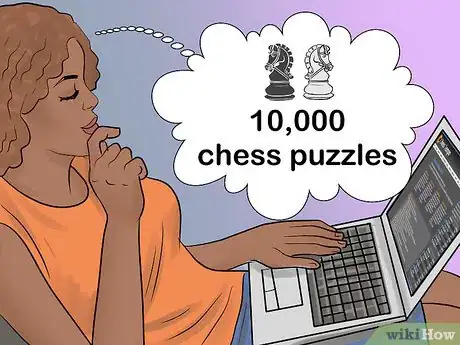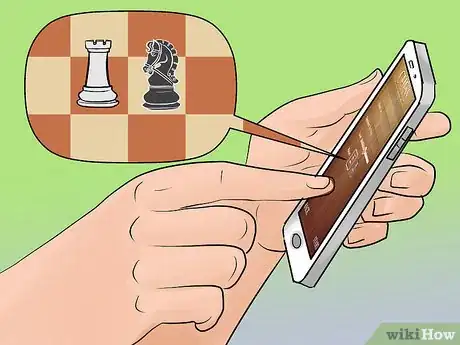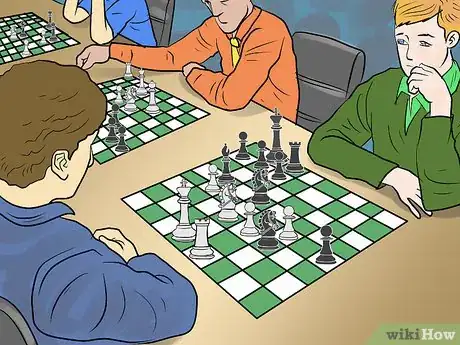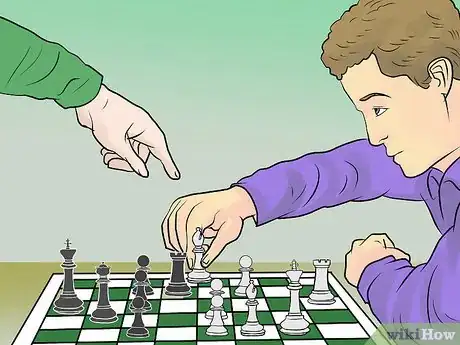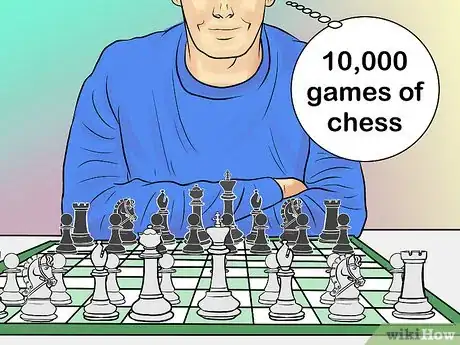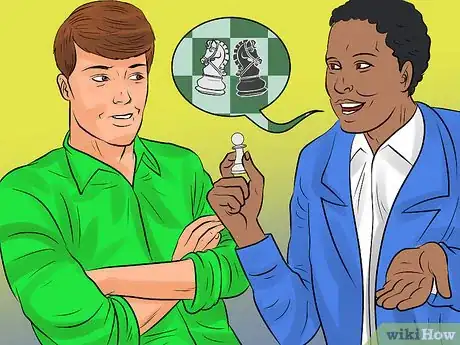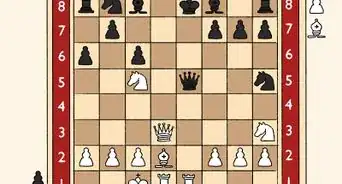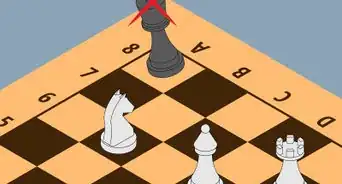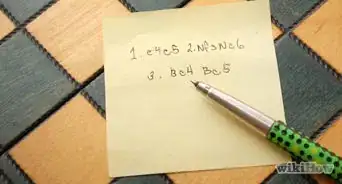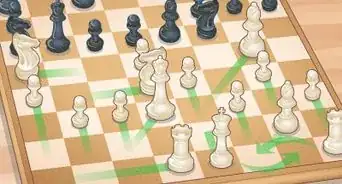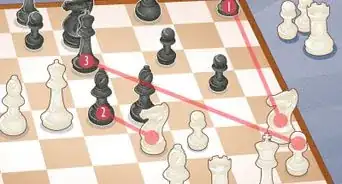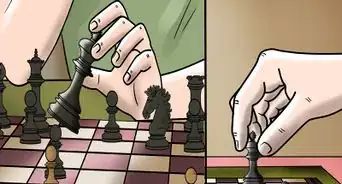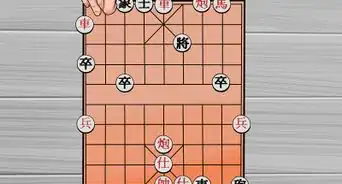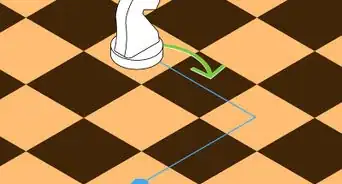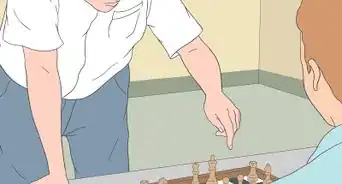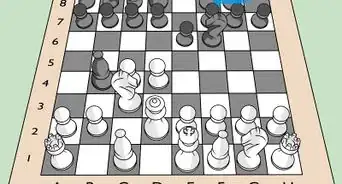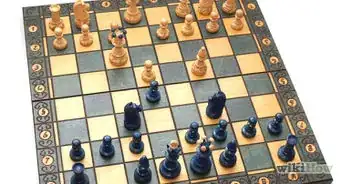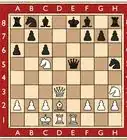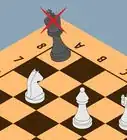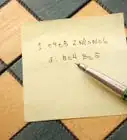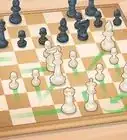This article was co-authored by Vitaly Neimer. Vitaly Neimer is an International Chess Master and Certified Professional Chess Coach with over 15 years of training experience. He has been a part of the United States' Webster SPICE national chess champion team and is also a two-time Israeli national chess champion.
There are 8 references cited in this article, which can be found at the bottom of the page.
wikiHow marks an article as reader-approved once it receives enough positive feedback. This article received 16 testimonials and 100% of readers who voted found it helpful, earning it our reader-approved status.
This article has been viewed 841,735 times.
Anyone can try their hand at a chess game, but it takes a bit more effort to become a good chess player. Read on to learn how to develop your chess skills.
Steps
Chess Help
Becoming a Better Chess Player
-
1Learn how to play. You can't get better if you don't know the rules or how to move a piece correctly.
-
2Join a local chess club. Be social and free with chess. Don't make yourself feel good by playing people that clearly are worse than you. If you have to make yourself feel better after a loss, a good way is to start planning how to counter your opponent.EXPERT TIPVitaly Neimer is an International Chess Master and Certified Professional Chess Coach with over 15 years of training experience. He has been a part of the United States' Webster SPICE national chess champion team and is also a two-time Israeli national chess champion.International Chess Master

 Vitaly Neimer
Vitaly Neimer
International Chess MasterOur Expert Agrees: If you can’t hire a coach, try joining a chess club. Local chess clubs usually have tournaments in which you can play. If you don’t have a club, try reading books, watching videos, or playing chess online to analyze the games and see what mistakes you’re making.
Advertisement -
3Learn the values of the pieces. A pawn is worth one point. Knights and bishops are worth three points each. A rook is worth five points. A queen is worth nine points. This is only a guideline, not a winning strategy, so if you have a forced win on your turn, you can disregard the piece values.[1]
- Don't give up material unnecessarily. While a well-planned sacrifice can sometimes put you well ahead in the game, losing pieces due to poor planning can do exactly the opposite. Defend your pieces well and plan sacrifices wisely.
- It is not advantageous to trade a bishop (worth 3) and a knight (worth 3) for a rook (worth 5) and a pawn (worth 1) because the knight and bishop are more powerful than a rook and the pawn will not come into play until the very end of the game.
- These values are relative. In some positions, a bishop or knight is stronger than a rook.
- An exchange (a knight or bishop for a rook) is not worth 2 points despite its apparent value. It is generally worth 1 to 1.5 points. Therefore 1 to 2 (sometimes 3) pawns is enough compensation for being down an exchange.
-
4Always develop bishops and knights. Pawns are overused and overextended, and often the developing pieces don't get developed. Then, your opponent will usually put a bishop through your pawn structure.[2]
- Moving too many pawns weakens the castled kingside and opens you up to attack. Moving too many pawns usually will weaken your endgame pawn structure.
-
5Find your style of play. There are many different ways people play chess. Some prefer aggressive playstyles and are quick to launch attacks, play gambits, or offer sacrifices. Others prefer quiet positional play, normally spending many turns building up a strong position before launching any attack. Try out various playstyles and find what you prefer.
-
6Enter your first tournament. Go there feeling like you are going to kick butt in this series of games. Forget the rating. Forget the scores. Just get out there and play the best you can; it is a self-fulfilling prophecy.
-
7Get a rival. Find someone that is better than you and "compete" against them. Play them. Go to the tournaments that they do. Slowly get used to their playing style and use it against them and other people. Don't think of this "rival" as someone to do better than. Don't beat yourself up if you lose. Play them again. And again. And again. Do this until you have learned their style and how to counter it.
-
8Study your favorite GM (grandmaster). Study, play, study, play. Learn how to use their techniques, and how to counter them.[3]
-
9Read a chess book. Here are a few good books:
- "The Mammoth book of Chess"
- "Logical Chess move by move" by Irving Chernev. It teaches you how to attack the king in the king pawn openings and how to play positional chess with the queen pawn openings.
- "My System" by Aaron Nimzovitch.
- "Think Like a Grandmaster" by Alexander Kotov. This book explains how to analyze variations so that you can play the middle game at a much higher level.
- "Judgement and Planning in Chess" by Max Euwe. A classic book that explains how to judge a position based on space advantage, combinations, endgame advantages, king attack, and pawn structures.
- "Bobby Fischer Teaches Chess" by Bobby Fischer. A classic book that teaches chess tactics for the beginner.
- "Chess Master vs. Chess Amateur" by Max Euwe and Walter Meiden. This book explains how a master beats an amateur by making the right move based on a position's needs.
- "Practical Chess Endings" by Irving Chernev. 300 endgames that start simple but end difficult.
- "1001 Checkmates" by Fred Reinfeld. A classic book that will help you to see checkmates and calculate the variations.
- "Ideas behind the Chess Openings" by Reuben Fine. This book explains the strategies behind the openings so that you can remember and play them better.
- "100 selected games" by Botvinnik.
- "Basic Chess Endings" by Reuben Fine. This is a thick book that is a classic and explains all types of endings.
- "Point Count Chess" by I. A. Horowitz. It's a classic book that rates 32 positional features and teaches how to convert these 32 advantages into a win.
- "How to win in the chess endings" by I.A. Horowitz. This book explains endgame strategies without complex variations.
- "Chess Fundamentals" by Jose Raul Capablanca. This book teaches the opening, middlegame, and endgame strategies.
-
10Learn the basic endgame rules. If ahead in material, exchange pieces, not pawns. If behind in material, exchange pawns and you can force a draw.[4]
- Without pawns, you must be at least a rook up to force mate. The only exception to this is that two knights and a king cannot force mate against a lone king.
- The king is a powerful piece, so use it to block and attack pawns.
- Bishops of opposite colors draw most of the time because neither side can advance pawns without losing them. A rook pawn and a bishop only draw against a black king if the bishop is the opposite color as the queening square.
- Bishops are worth more than knights in all but locked pawn positions.
- Pawns, rooks, and bishops become more valuable as the game proceeds so play to keep them.
- Many games with all the pawns on one side of the board end in a draw. 90% of master games end in a draw where all the pawns are on one side of the board because the master with the fewer pawns will exchange pawns and then sacrifice a knight or bishop for the last of the pawns. If you are left with just a bishop or knight you cannot force mate.
- Rook and knight or rook and bishop many times can only draw against a rook.
- In queen endings, the player who moves the queen to the center first dominates play typically.
-
11Understand strong pawn structures. Powerful pawn structures include:[5]
- An "outside pawn" lures the opponent’s king to the other side, enabling you to gobble the rest of his pawns or advance your pawns on the other side of the board.
- A "passed pawn" is not obstructed by another pawn and should be pushed. Nimzovitch said, "Passed pawns must be pushed."
- A "protected passed pawn" is a passed pawn that is protected by another pawn. A protected passed pawn forces the opponent to constantly defend against an advance.
-
12Understand pawn structures to avoid. Weak pawn structures include:[6]
- Doubled pawns cannot defend each other and are subject to attack.
- Isolated pawns are weak and must be defended by a piece.
- Backward pawns on open files are extremely weak and subject to attack by rooks.
- A king with the opposition can draw against a king with a pawn.
- A rook on the seventh rank is worth sacrificing a pawn.
- Zugzwang is where if your opponent moves his position becomes weaker (he would rather give up his turn), and is common in chess.
- Rook and pawn endings are the most complicated so avoid them.
-
13Play blindfold chess. That will train you not to keep forgetting and relearning which pieces are attacking which squares until you look and see. Since your brain will be forced to memorize so much information about the state of the board anyway, it won't be that much harder for it to learn to organize the information it learns about the board into a different set of pieces of information than ones that describe which piece is on which square, and you will instead get slowly trained to see the whole picture, notice very complex statements about the state of the board, and notice patterns of which complex statements about the state of the board should be figured out to decide which move to make. In fact, you will eventually even become better at blindfold chess than you would have been at non-blindfold chess if you had done the same amount of training using non-blindfold chess, though you won't be better at the current game done blind than you would be if you played that current game non-blindfold and the purpose of continuing to play it blindfold is to train for future chess games.[7]
-
14Notice patterns in what moves tend to make you win the game. Don't follow step 3 all the time with no exceptions, but rather judge the arrangement of pieces and decide whether it's really worth making a trade. It's good to trade pieces more easily if you're ahead as shown in the following sentence. If you would have a forced win if you promoted a pawn to a rook that would require losing the rook later, then you will still have a forced win if you promote it to a queen and don't do whatever you can to stop it from being traded for a rook and bishop because the queen can make any move a rook can make and so could use the winning strategy that the rook would have used. Use your trained ability to notice patterns to try to make a move that you predict will cause your opponent to make a mistake enabling you to win. The strategy can include knowledge of which person you're playing against, noticing which mistakes your opponent was making earlier in the game, or noticing patterns of the general type of mistake people tend to make.
Practicing Like a Champion
-
1Memorize the first 12 moves of the 20 top grandmaster games. You can find these games online easily at sites like chessgames.com. You should memorize the first ten moves of black and white to get a sense of how true masters begin their chess games. This will help you get a sense of not just how to succeed, but how to truly excel. Also, memorizing these moves will make you more disciplined because you'll have to train your mind to absorb these moves as well as to understand what makes them so great.[8]
-
2Solve 10,000 puzzles on your favorite puzzle website. You can use websites like Chesstempo, Chessity, or Puzzle Books. As Malcolm Gladwell once hypothesized, working on anything for 10,000 hours will make you an expert, so imagine what a pro you'll be after solving 10,000 puzzles! Of course, this can take a very long time to achieve, but if you aim to do at least one a day, you will go far. You can also start by setting a more realistic goal for yourself, such as 1,000 puzzles, and see where you go from there.
- Try not to get too fixated on the exact number. While frequent practice is certainly helpful, especially for disciplines that have fixed rules (like chess), some studies suggest that the impact might be less significant than Gladwell's initial hypothesis.[9] Nevertheless, practice is useful, so make a habit of playing puzzles on your favorite website as frequently as you reasonably can.
-
3Use chess apps on your phone. You can also use the world champs chess app or other apps that are geared toward chess players. Though practicing to be a chess master takes complete concentration, having an app on your phone that relates to chess can help you train when you find yourself with some unexpected free time.
-
4Play in local tournaments. Sign up for as many as you can and make sure you play at least once a week, no matter how tired or frustrated you may be. Local tournaments are the way to help you practicing playing against real players and to improve your technique and strategy.
-
5Review your games with a chess engine or chess coach. Having a chess coach may cost a pretty penny, but he can definitely help you improve at the game and to develop the discipline to be able to think outside the box. You can also find a chess engine online that can help you review your moves and have a sense of what you did wrong and what you did right. Recognizing your flaws and your strong suits is the best way to succeed in chess.
-
6Play at least 10,000 games of chess. Remember what we said about becoming a true professional after you've done anything for 10,000 hours? Though doing all of the above practice methods will certainly help, in the end, it's all about playing as many games as you can. If you're truly committed to being a better chess player, this is the path you should follow.
- Again, try not to get too fixated on the exact number. Just keep in mind that playing chess as frequently as you can against real opponents will ultimately help you improve your skills.
-
7Talk to a good chess player. One of the best things you can do to get better at anything is to talk to someone who knows the game and is good at it. It can be a relative, a grandmaster, or even someone who beat you.
Community Q&A
-
QuestionHow do you castle in online chess?
 Community AnswerTo castle, move your king two steps towards the rook. It will automatically move the rook.
Community AnswerTo castle, move your king two steps towards the rook. It will automatically move the rook. -
QuestionFor me chess is impossible. For whatever reason, I never win no matter how inept my opponent is. What can I do?
 Dieyun DingTop AnswererChess is a game where players have to look at the bigger picture. Sometimes, it just isn't worth it to move a single piece that can capture a lot of pieces in the beginning -- in the opening, your only goals are to control the center and defend your king. Employing tactics such as forking and pinning will help you gain material later on -- and never make a move without seeing if the opponent can directly capture, fork or pin one of your pieces after the move. With every move, ask yourself how the move will help you. If every move can do more than one thing for you, it's as good as being able to move twice every turn.
Dieyun DingTop AnswererChess is a game where players have to look at the bigger picture. Sometimes, it just isn't worth it to move a single piece that can capture a lot of pieces in the beginning -- in the opening, your only goals are to control the center and defend your king. Employing tactics such as forking and pinning will help you gain material later on -- and never make a move without seeing if the opponent can directly capture, fork or pin one of your pieces after the move. With every move, ask yourself how the move will help you. If every move can do more than one thing for you, it's as good as being able to move twice every turn. -
QuestionShould I sacrifice a rook or a castle to stop an opponent's pawn from promoting or demoting?
 Community AnswerSince a promoted pawn typically becomes a queen, sacrificing a rook makes sense. (There is no such thing as "demoting.")
Community AnswerSince a promoted pawn typically becomes a queen, sacrificing a rook makes sense. (There is no such thing as "demoting.")
Warnings
- Do not try to win with the Scholar's mate (the four move checkmate); most players who have a background in chess will use this to their advantage.⧼thumbs_response⧽
References
- ↑ https://www.chess.com/article/view/chess-piece-value
- ↑ https://www.chess.com/article/view/the-10-most-common-mistakes-among-chess-beginners
- ↑ https://www.chess.com/article/view/the-point-of-studying-master-games-part-one
- ↑ https://thechessworld.com/articles/endgame/7-most-important-endgame-principles/
- ↑ https://thechessworld.com/articles/endgame/7-basic-pawn-structure-you-must-know/
- ↑ https://thechessworld.com/articles/endgame/7-basic-pawn-structure-you-must-know/
- ↑ https://www.wsj.com/articles/the-tricks-of-blindfold-chess-1485526096
- ↑ https://www.chessbazaar.com/blog/make-best-chess-opening-moves/
- ↑ https://www.businessinsider.com/new-study-destroys-malcolm-gladwells-10000-rule-2014-7?IR=T
About This Article
To become a better chess player, start by developing your bishops and knights, because using too many pawns tends to open up your king to attack. Then, learn which pawn structures are powerful, such as the outside or passed pawn, and which ones are weak, like doubled or isolated pawns. If you’re behind at the end of the game, you can exchange pawns to force a draw. However, if you’re ahead, exchange pieces to draw out your opponent’s pawns and go for the win. For tips on how to find opportunities to practice as a beginning chess player, read on!
